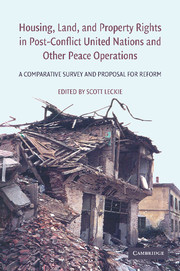 Housing, Land, and Property Rights in Post-Conflict United Nations and Other Peace Operations
Housing, Land, and Property Rights in Post-Conflict United Nations and Other Peace Operations Book contents
- Frontmatter
- Contents
- Contributors
- Acknowledgments
- Foreword by Dan Lewis
- I INTRODUCTION
- II CASE STUDIES
- 2 Stability, Justice, and Rights in the Wake of the Cold War: The Housing, Land, and Property Rights Legacy of the UN Transitional Authority in Cambodia
- 3 The Response of the United Nations Interim Administration Mission in Kosovo to Address Property Rights Challenges
- 4 Balancing Rights and Norms: Property Programming in East Timor, the Solomon Islands, and Bougainville
- 5 Housing, Land, and Property Restitution Rights in Afghanistan
- 6 Peacekeeping and HLP Rights in the Great Lakes Region of Africa: Burundi, Rwanda, and DR Congo
- 7 The Trouble with Iraq: Lessons from the Field on the Development of a Property Restitution System in “Post”-Conflict Circumstances
- 8 Sudan's Comprehensive Peace Agreement: An Opportunity for Coherently Addressing Housing, Land, and Property Issues?
- 9 The Impacts of UN Peace Operations on Local Housing Markets
- III CONCLUSIONS
- Index
9 - The Impacts of UN Peace Operations on Local Housing Markets
Published online by Cambridge University Press: 15 July 2009
- Frontmatter
- Contents
- Contributors
- Acknowledgments
- Foreword by Dan Lewis
- I INTRODUCTION
- II CASE STUDIES
- 2 Stability, Justice, and Rights in the Wake of the Cold War: The Housing, Land, and Property Rights Legacy of the UN Transitional Authority in Cambodia
- 3 The Response of the United Nations Interim Administration Mission in Kosovo to Address Property Rights Challenges
- 4 Balancing Rights and Norms: Property Programming in East Timor, the Solomon Islands, and Bougainville
- 5 Housing, Land, and Property Restitution Rights in Afghanistan
- 6 Peacekeeping and HLP Rights in the Great Lakes Region of Africa: Burundi, Rwanda, and DR Congo
- 7 The Trouble with Iraq: Lessons from the Field on the Development of a Property Restitution System in “Post”-Conflict Circumstances
- 8 Sudan's Comprehensive Peace Agreement: An Opportunity for Coherently Addressing Housing, Land, and Property Issues?
- 9 The Impacts of UN Peace Operations on Local Housing Markets
- III CONCLUSIONS
- Index
Summary
Introduction
This chapter addresses the impacts of UN peace operations on local housing markets. These impacts encompass the effects, both negative and positive, that the presence of highly paid international staff – often associated with UN peacekeeping missions and other field operations – may have on local housing markets. Indeed, anecdotal evidence from peacekeeping mission personnel, as well as many UN staff living “in the field,” suggests that the marked disparity that exists in income levels between “internationals” and “locals” leads to local economic inflation in a number of sectors. By many accounts, the housing sector has been no exception.
This phenomenon amounts to what may be called a kind of “UN inflation” in local housing markets. This trend, while often spurring housing renovation and restoration, at the same time can increase housing costs to such an extent that the housing market becomes skewed, catering to the desires of more affluent renters and owners. Moreover, this initial inflation may be compounded further down the road by foreign investments and intensified real estate developments that are spurred on by higher levels of economic and political stability once hostilities in a country have ended. In these cases, the inflation effect may be so strong as to affect all categories of housing stock – from affordable housing and rental units, to moderate income homes, to luxury housing – raising the cost of housing to such an extent that it is increasingly out of economic reach for average locals.
- Type
- Chapter
- Information
- Housing, Land, and Property Rights in Post-Conflict United Nations and Other Peace OperationsA Comparative Survey and Proposal for Reform, pp. 310 - 326Publisher: Cambridge University PressPrint publication year: 2008
